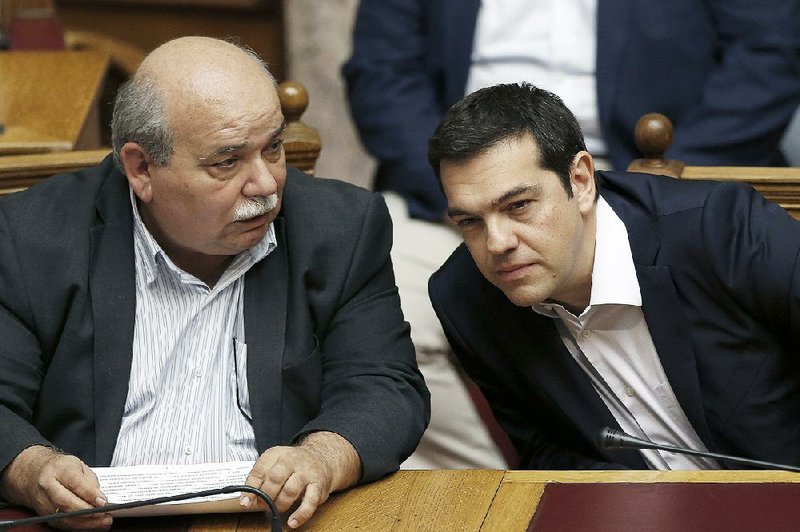ATHENS, Greece -- Greece's Parliament voted early today in favor of Prime Minister Alexis Tsipras' motion to hold a referendum on the country's creditor proposals for changes in exchange for loans. Tsipras and his coalition government have urged people to vote against the deal, throwing into question the country's financial future.
The vote is to be held July 5. It has raised the question of whether Greece can remain in Europe's joint currency, the euro. Many Greeks alarmed by the announcement for the referendum early Saturday lined up at ATM machines, putting a further strain on banking deposits.
Meanwhile, on Saturday, eurozone nations rejected a month-long extension to the nation's bailout program.
Tsipras surprised Greece's creditors late Friday when he called for a referendum in a week on whether to accept the changes the rescue lenders want in return for more financial aid. The country's bailout program ends Tuesday, and without an extension or more loans from creditors, Greece is likely to be in arrears on a debt payment due the same day. Its banks face the risk of collapse.
The Greek government's call for the people to vote against a proposed bailout deal from international creditors July 5 angered many of its eurozone partners.
"We must conclude that, however regretful, that the program will expire on Tuesday night. That is the latest date that we could have reached an agreement," said Jeroen Dijsselbloem, the top eurozone official.
"The Greek authorities have asked for a month extension. But in that month there can be no disbursements," he said. "How does the Greek government think that it will survive and deal with its problems in that period? I do not know," Dijsselbloem said.
France's finance minister, Michel Sapin, stressed that a deal was still possible and that he was ready to act as a go-between for Greece and the creditors.
Now, much will depend on whether the European Central Bank will continue to prop up Greek banks even after the country's bailout program expires. It would be under pressure to stop using eurozone taxpayer money to keep alive the banks if there is no prospect for a deal.
In that case, the banks likely would collapse, and the Greek government would have to support them. Penniless, the government would have to revert to printing a new currency, effectively drawing the country out of the euro union.
The governing council of the European Central Bank will meet "in due course" to assess the situation, it said.
Greek Finance Minister Yanis Varoufakis said Athens and lenders still had time to improve the deal -- and avoid a negative outcome to the referendum. "There is no reason why we can't have a deal by Tuesday. If the deal is acceptable, we will recommend a positive vote," he said.
"It's a sad day for Europe, but we will overcome it," Varoufakis said upon leaving while his counterparts continued talks.
Across Athens, people started flocking to cash machines shortly after Tsipras announced the referendum proposal around 1 a.m. local time Saturday. The Bank of Greece assured in a statement that the flow of cash will continue.
The referendum will ask Greeks to vote on a proposal of changes that the country's creditors made Thursday. The Greek government rejected it as imposing cuts that are too harsh on the general population.
The Greek government said it would recommend Greeks vote no in the referendum, but Varoufakis noted "the high possibility that the Greek people will vote against the advice of the Greek government."
What would happen in that case -- whether Greece would have to leave the euro or try to renegotiate more time with creditors -- is unclear.
An exit from the euro would put Greece through a new era of economic pain. With the new currency less valuable than the euro, the government would have to write off a chunk of its foreign loans and many companies and households would go bankrupt. Experts predict a long and deep recession in a country that has already been through five years of economic depression.
The uncertainties of all this would roil European and global markets, though experts are divided on the extent.
In the streets of Athens, views were mixed on the merits of holding a referendum.
"The people are not in a position to decide. Those who are in position to decide are the ones that know a bit more, and they must explain and simplify the issues for the people," said Grigoris Kanellopoulos, 41, a street seller of bagels.
Athina Kontosozou, 56, has already made up her mind about how she will vote.
"No [to the creditors' proposals], no to any more measures. We don't know what will happen [after the referendum]. Let's hope that things will be better. And they will get better. We believe it," she said.
Information for this article was contributed by Thanassis Stavrakis, Paris Ayiomamitis, Raf Casert and Lorne Cook of The Associated Press.
A Section on 06/28/2015
